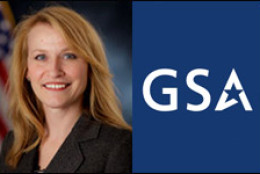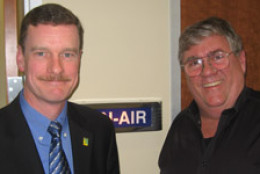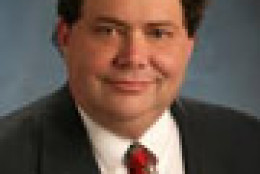Contracts/Awards
-
President Obama is renewing and expanding a policy that will let the government pay its contractors faster. Contractors will get to pay their subcontractors faster, too. The White House says QuickPay has generated more than a billion dollars for small businesses, freeing up their capital to invest and hire employees. For how this is playing out at the ground level, Tom Temin and Emily Kopp spoke with Necole Parker, principal and CEO of the Elocen Group, on the Federal Drive. She described how QuickPay has benefited her company.
July 31, 2014 -
After spending $1 billion on a failed border security fence project, the Homeland Security Department restarted the project a couple of years ago. But it didn't get far. A $145 million award for seven new surveillance towers has been halted thanks to a successful protest. Raytheon filed the protest against the winning bidder, EFW, an affiliate of the Israeli defense contractor Elbit. The Government Accountability Office sustained the protest. In this week's legal loop segment, Procurement Attorney Joe Petrillo joined Tom Temin and Emily Kopp on the Federal Drive to sort out the case.
July 31, 2014 -
Tiffany Hixson, the professional services category executive at GSA's Federal Acquisition Service discusses the new professional services category management agenda for FAS and what it means for customer agencies and contractors. July 29, 2014
July 29, 2014 -
Host Mark Amtower discusses the SmartPay program with David Shea, director, Office of Charge Card Management at the General Services Administration. July 28, 2014
July 28, 2014 -
If you want to wave a red flag to get contractors' hackles up, just say the words, "lowest-price, technically acceptable." It may not sound like best value, but in a world of tough budgets, that's the way agencies are going. How can the strategy work for both sides? Kenneth Gilliland, an attorney with the Army's Armament Research, Development and Engineering Center spoke to Tom Temin at the National Contract Management Association World Congress at National Harbor. View photos and listen to more interviews from the conference.
July 28, 2014 -
Contracts are like marriages. Everyone enters into them optimistically and with the best intentions. But, they don't always work out. Sometimes an agency has to terminate a contract. Termination requires care, though. Jamie Sybert is a director, and David Kirschbaum is a principal at the accounting and contracts advisory firm Baker Tilly. They spoke with Tom Temin at the National Contract Management Association World Congress. They've got advice for clean separations. View photos and listen to more interviews from the conference.
July 28, 2014 -
Congress heads toward summer recess next week. As they leave town, federal employee issues seem to be on their minds more than normal. Rep. Blake Farenthold (R-Texas) is chairman of the House Oversight and Government Reform Subcommittee on the Federal Workforce, U.S. Postal Service and Census. He chaired a hearing last week on the future of the General Schedule. On In Depth with Francis Rose he has the details about the recent hearing.
July 25, 2014 -
A new bill aims to give women-owned small businesses more opportunities to win federal contracts. The Women Small Business Procurement Parity Act would help agencies meet the goal of awarding 5 percent of all contracts to women-owned small businesses. Also, it would ensure that women get a fair shot at growing their businesses and create jobs. Kristie Arslan is executive director of Women Impacting Public Policy. She joined Tom Temin and Emily Kopp on the Federal Drive to discuss the new bill.
July 25, 2014 -
Anne Rung, President Obama's nominee to lead the Office of Federal Procurement Policy, detailed her three major priorities should the Senate confirm her. Lawmakers press Rung on improving communication between OMB and Congress, and how best to deal with the multi-sector workforce.
July 25, 2014 -
The Social Security Administration says its new $300 million IT system still doesn't work. SSA wants to replace outdated computer systems that contribute to its backlog of disability claims. The agency says outside consultants will try to get the project back on track, but it still has no idea when it will be ready to launch. Jeff Neal is senior VP of ICF International and former chief human capital officer at the Department of Homeland Security. He's tells Francis Rose on In Depth that it's not just IT projects, but all types of federal contracts that can be where good ideas go to die.
July 24, 2014 -
An unresponsive, or sclerotic contracting system is not a good fit for our fast-paced information world, says Jeff Neal, former chief human capital officer at the Department of Homeland Security.
July 24, 2014 -
Jeff Koses, senior procurement executive for the General Services Administration, will discuss his acquisition priorities for the agency. July 22, 2014
July 22, 2014 -
The fourth quarter of fiscal 2014 is in full swing. Last year's fourth quarter saw federal agencies hand out $125 billion in new contract obligations, according to Guy Timberlake. He's chief visionary and chief executive officer of the American Small Business Coalition. On In Depth with Francis Rose, he said federal contractors can find plenty of ways to take advantage of the fiscal year-end spending spree -- as long as they take a simple approach.
July 21, 2014 -
Congress has put the onus on federal contractors to make sure they are not including counterfeit or obsolete parts in equipment they sell to the government. The law was passed in 2012. Only now has the Federal Acquisition Regulatory Council come out with a proposed rule. It requires contractors to report counterfeits, suspected counterfeits, and anything they suspect of being non conforming. The proposed rule covers primes, sub contractors, and subs to subs, all down the line. Alan Chvotkin, executive vice president and counsel to the Professional Services Council, joined Tom Temin and Emily Kopp on the Federal Drive to discuss what contractors think of the new rule.
July 21, 2014 -
The Federal Acquisition Regulatory Council would require all contractors at the prime and sub levels to report counterfeit or suspected counterfeit parts to the government.
July 21, 2014













